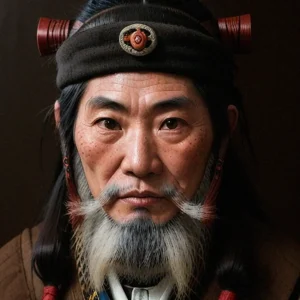Japan’s names have unique or special meanings and a lot of historical stories behind them. Beauty, positive qualities, and based on nature often inspire it. Generally, Japanese names are separated into two parts. A given name and second a family name. We will explore all kinds of Japanese names you will enjoy our unique and popular Japanese name collection.
Traditions of Japanese Names
Methodology and history have deep roots in Japanese names. Some names also reflect the birth order. Taro, for instance, means ‘the first-born male. Many names come from long-ago stories about gods and heroes. Historical figures also had great names, like “Nobunaga,” a famous samurai. These names are rich in meaning and tell stories from the past of Japan, making them unique and special.
How to use Japanese Names

To use Japanese names first you need to understand their cultural significance and structure. Japanese names are mostly based on a family name followed by a given name. When someone addresses a formal family name followed by “san,” this is a respectful honorific so it was used politely if the name is “Haruki Suzuki” you could say “Suzuki-san”.
Japanese Names for Girls
- Aiko – “Love child”
- Haruka – “Distant” or “far-off”
- Kaori – “Fragrance”
- Yoshiko – “Good child”
- Rina – “Jasmine”
- Mio – “Beautiful cherry blossom” or “truth”
- Sakura – “Cherry blossom”
- Hina – “Sunlight”
- Umeko – “Plum blossom child”
- Emi – “Beautiful blessing” or “favor”
- Aya – “Color” or “design”
- Miyu – “Beautiful gentle”
- Natsuki – “Summer hope”
- Yukiko – “Snow child”
- Asuka – “fragrance” or “to fly”
- Okuma – “Child of the city”
- Yurie – “Lily of the Valley”
- Reina – “Elegant”
- Wakana – “Harmonious music”
- Tomomi – “Beautiful friend”
- Emiko – “blessed, beautiful child”
- Kaede – ” maple tree”
- Kiyomi – ” pure beauty”
- Rena – “Lovely or graceful”
- Amaya – ” heavenly valley”
Japanese Names for Boys
- Haruto – “Sun flying”
- Hiroki – “Abundant joy”
- Taiga – “Big and great”
- Kaito – “Ocean flying”
- Riku – “Land”
- Yuto – “Tender person”
- Hiroshi – “Generous”
- Daiki – “Great glory”
- Ryuu – “Dragon”
- Kazuki – “Harmony” or “hope”
- Shin – “True”
- Takumi – “Artisan” or “skillful”
- Masaru – “Victory”
- Takashi – “Noble” or “prosperous”
- Jiro – “Second son”
- Yuji – “Heroic second son”
- Kazuma – “One true horse”
- Atsushi – “Industrious” or “hardworking”
- Kenji – “Intelligent ruler”
- Nobu – “Faith”
- Daichi – “large, great”
- Ryota – “refreshing thick”
- Minato – “harbor”
- Tatsuya – “accomplished”
- Tosiya – “friend”
Japanese Names with Dark Meanings
- Kurai – “Dark”
- Yami – “Darkness”
- Akumu – “Nightmare”
- Ayakashi – “Ghost” or “phantom”
- Kage – “Shadow”
- Kurayami – “Darkness”
- Jigoku – “Hell”
- Kurogami – “Black god”
- Ankoku – “Darkness”
- Mei – “Dark” or “cloudy”
- Shikyo – “Death”
- Satsujin – “Murder”
- Onryo – “Vengeful spirit”
- Fukushuu – “Revenge”
- Zankoku – “Cruel”
- Hakai – “Destruction”
- Shinen – “Death”
- Bourei – “Ghost” or “apparition”
- Mugen – “Infinite”
- Gekido – “Fury” or “rage”
- Yabai – “dangerous”
- Muma – “evil spirit”
- Yamiyo – ” dark night”
- Shinigami – “grim reaper”
- Akuma – ” devil”
Unisex Japanese Names
- Hinata – “Sunny place” or “facing the sun”
- Kazumi – “Beautiful harmony”
- Haru – “spring” or “sunlight”
- Nao – “Honest” or “straightforward”
- Sora – “Sky”
- Asahi – “Morning sun”
- Maruyama – “Treasured man”
- Aoi – “Blue”
- Maki – “True hope”
- Ren – Depending on the kanji, “lotus” or “love”
- Hikaru – “Radiance” or “light”
- Miyuki – “Beautiful snow”
- Kyo – “Cooperation” or “capital”
- Shinobu – “Endurance” or “recall”
- Sei – “Quiet” or “refined”
- Midori – “Green”
- Mitsu – “Light” or “shine”
- Natsu – “Summer”
- Makoto – “Sincerity”
- Ryo – “Cool” or “refreshing”
- Mika – “fragrance of the day”
- Michi – “Pathway”
- Kai – “ocean”
- Arisu – “Alice”
- Chizuko – “bird”
Cool Japanese Names
- Raiden – “Thunder and lightning”
- Kuro – “Black”
- Hiroto – “Large step”
- Rikuto – “Land person”
- Koharu – “Little spring”
- Hayato – “Falcon person”
- Yamato – “Great harmony”
- Ichiro – “First son”
- Genji – “Two beginnings”
- Kenshin – “Modest truth”
- Arata – “Fresh”
- Shiro – “Fourth son”
- Kaoru – “Fragrance”
- Renkoro – “Benevolent second son”
- Eiji – “Eternal second son”
- Masato – “Righteous person”
- Shoma – “Big and true”
- Isamu – “Brave”
- Ryoma – “Dragon horse”
- Seiji – “Clear victory”
Creative Japanese Names
- Hoshiko – “Star Child”
- Hikari – “Light”
- Tsubasa – “Wings”
- Mizuki – “Beautiful moon”
- Ame – “Rain”
- Tori – “Bird”
- Umi – “Ocean”
- Yoru – “Night”
- Renjiro – “Lotu’s second son”
- Yume – “Dream”
- Nozomi – “Hope”
- Kaze – “Wind”
- Aika – “Love song”
- Ayame – “Iris”
- Ringo – “Apple”
- Kohaku – “Amber”
- Shiori – “Poem” or “bookmark”
- Tsuki – “Moon”
- Yuki – “Snow”
- Kasumi – “Mist”
- Aimi – “loving truth”
- Yua – “bound by love”
- Yuzuki – “Hope”
- Miyabi – “refinement”
- Chiaki – “clear, crystal”
Funny Japanese Names
- Taro – “First son”
- Pochi – “Dog”
- Maru – “Circle”
- Buta – “Pig”
- Kappa – “Water sprite”
- Mochi – “Rice cake”
- Saru – “Monkey”
- Kuma – “Bear”
- Neko – “Cat”
- Fugu – “Blowfish”
- Oni – “Demon”
- Kame – “Turtle”
- Tanuki – “Raccoon dog”
- Kumo – “Cloud”
- Usagi – “Rabbit”
- Shika – “Deer”
- Inu – “Dog”
- Hebi – “Snake”
- Tako – “Octopus”
- Ushi – “Cow”
- Kotaro – “son”
- Itsuki – “tree”
- Akihito – “bright”
- Akio – “hero”
- Atsuko – “deep, true”
Cute Japanese Names for Babies
- Momo – “Peach”
- Riko – “Child of truth”
- Ami – “Beautiful”
- Hana – “Flower”
- Kira – “Shining”
- Nana – “Seven”
- Koko – “Little child”
- Piko – “Tiny”
- Rin – “Dignified” or “cold”
- Risa – “Ceremony” or “profit”
- Fumi – “History” or “fable”
- Suzu – “Bell”
- Misa – “Beautiful bloom”
- Chika – “Scattered flowers”
- Tama – “Jewel”
- Yuna – “Kindness” or “superior”
- Nami – “Wave”
- Kina – “Lively”
- Mia – “Beautiful cherry blossom”
- Yui – “Bind”
Last Japanese Names
- Sato – “Village, village headman”
- Suzuki – “Bell Tree”
- Takahashi – “Tall Bridge”
- Tanaka – “Center of the rice field”
- Watanabe – “Crossing over”
- Ito – “Wisteria”
- Yamamoto – “Base of the mountain”
- Nakamura – “Middle village”
- Kobayashi – “Small forest”
- Kato – “Increase, wisteria”
- Yoshida – “Lucky rice field”
- Yamada – “Mountain rice field”
- Sasaki – “Assistant, wisteria”
- Matsumoto – “Base of the pine tree”
- Inoue – “Above the well”
- Kimura – “Tree village”
- Shimizu – “Pure water”
- Hayashi – “Forest”
- Abe – “Peaceful”
- Ueno – “Upper field”
Famous Japanese Names
- Akira – “Bright, clear”
- Hayao – “Fast-growing”
- Hidetoshi – “Splendid, wise man”
- Ken – “Healthy”
- Yoko – “Ocean child”
- Haruki – “Shining Spring”
- Takeshi – “Warrior”
- Nobuo – “Faithful, upper pine”
- Masaharu – “Prosperous, large”
- Tadashi – “Correct”
- Naomi – “Honest, beautiful”
- Shigeru – “Luxuriant”
- Toshiro – “Intelligent”
- Satoshi – “Quick wits, becoming”
- Mamoru – “Protecting”
- Koji – “Little second child”
- Fujimoto – ” Night rain”
- Kazuo – “Peaceful”
- Rinko – “Companion, chrysanthemum”
- Junichiro – “Obedient first son”
-
How can select a last name in Japanese?
Answer. While choosing a last name in Japanese, normally what is considered are the cultural norms and tastes; it is best to choose characters that reflect personal values or aspirations and ensure cultural sensitivity, consider personal preference, and consult with native speakers if possible.
-
How to choose Japanese names?
Answer. The choice of a person’s name is also influenced by its meaning, sound, and association to some extent in the Japanese culture. For more effective translation, one must find out popular traditional names, what they mean, and what is commonly associated with them in Japan. You might also need to consult your friends and relatives on issues of culture to make sure you are not infringing on any culture.
-
What is a Japanese name for a boy?
Answer. One of the fancy Japanese first names that a boy could be given could be “Haruto” it translates to “sunlight” or “man of sunshine” and is associated with positive qualities and light.
-
What is a good name for a girl in Japanese?
Answer. A good name for a girl is “Sakura (桜)” which means “cherry blossom”, it signifies beauty, grace, and the transient nature of life.
-
What Japanese name means God’s gift?
Answer. The “Megumi” is a best for means “blessing” or “grace,” and it can be taken as “God’s gift” due to its positive implications.
Read More: 200 Badass Warrior Barbarian Names for You
Final words
We looked at the importance of Japanese names and their meanings. We found that when choosing Japanese names, family, historical, or religious criteria are usually taken into account. While studying these names we noticed that each name is associated with its special meaning and historical background which is a meaningful experience for the chooser to understand that a name is a message of a person’s identity, social status, and the hopes of their parents. This name highlights various aspects of an individual’s life and also shows the traditional component of his personality.
Finally, by studying Japanese names we understand the depth and social significance of their meanings. Each name carries a very beautiful and important message with its origin and historical background reminding us that each personality is an individual with its significance and uniqueness.
